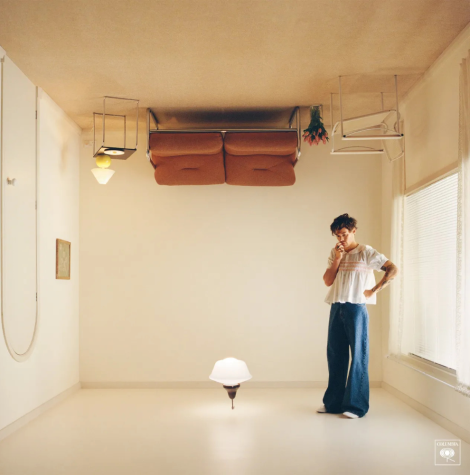‘Harry’s House’ is held back by carefree tone
May 31, 2022

“Green eyes, fried rice, I could cook an egg on you.” These ridiculous first lines almost perfectly introduce the eccentric, sometimes-confusing and light-hearted world of Harry Styles’s third studio album, “Harry’s House.” The LP was released May 20 to much anticipation after the commercial and critical success of his two previous releases. Both albums redefined Harry as an artist after his run with the boy-band “One Direction,” demonstrating new facets of his musical ability in lyrical vulnerability and creative production.
“Harry’s House” as a whole wins in the same way it loses: what the album gains in style, coherence and ambience it loses in innovation, substance and lyricism.
The album comes after the massive success of the lead single “As It Was,” which introduced a newer lighthearted synth-pop production, while including melancholy lyrics like “Harry, you’re no good alone,” and “What kind of pills are you on?” This juxtaposition becomes a theme continuously demonstrated through the rest of the album.
Almost every track on the album utilizes a similar groovy tone, ’80s style guitar, snare drum and synth, which excel in making the listener feel as though they are enjoying an uneventful summer day. The combination of sounds makes you feel like you are home.
Despite some horns, scatting and deafening drums, the coherence of the sound leads to many of the songs merging into a stretching backtrack that, if you don’t pay close enough attention, makes some songs indistinguishable from the last.
This isn’t helped by some almost nonsensical and simple lyrics. The chorus of “Cinema” — “I just think you’re cool, I dig your cinema” — is either a metaphorical mumbo-jumbo or completely misses the mark of what it was trying to achieve. The list-like lyrics of “Keep Driving” are definitely enticing, but lacking in meaning with lines like “Maple syrup/ Coffee, pancakes for two/ Hash brown, egg yolk.”
Finally, the concluding song, “Love of my Life,” seems lack-luster, not fulfilling the promise set by its grand title. The songwriting isn’t anything spectacular with the rather-cliche message of lost love. However, the stagnant production doesn’t let this song shine as much as it could.
There is no denying that many tracks are well-written and interesting in their own way, but this repeated style makes it hard to see that, taking away from the album as a whole.
However, two acoustic tracks disrupt this flow: “Matilda” and “Boyfriends.” Matilda uses the classic Road Dahl book to characterize someone close to Harry healing from trauma with lyrics like “You can let it go,” and “You don’t have to be sorry for leaving and growing up.” The tenderness of the track is one of the most memorable moments on the album.
“Boyfriends” has an enchanting vocal delivery accompanied by a haunting acoustic guitar describing the faults of a stereotypically “inconsiderate-boyfriend.” Although the sentiment is sweet, the song comes across almost as pandering to or tokenizing Harry’s primary base of young-girls.
The album has its highlights upon repeated listens, mostly driven by the unique sound of the production.
In “Satellite,” Harry sings about wishing for his partner to “pull him in” emotionally like a satellite to a gravitational force. However, during the bridge the simplistic production crescendos into drums, synths, and echoing vocals, as if the metaphorical satellite is losing control, demonstrating the failing of the relationship.
The third track, “Grapejuice,” is again thematically and lyrically simple, being about a dream of spending quality time with your partner. However the stylistic production drives the song as a whole. It begins with Harry whispering “One, two, three” followed by a jarring bass that quickly merges into a more light-hearted guitar beat characteristic of the album. Harry’s airy and light vocal delivery allows the strumming guitar to shine. The song concludes with a plucky guitar solo that makes the idealistic daydream Harry creates come to life.
“Daydreaming” is the epitome of a perfect pop song. High energy, light-hearted lyrics and ear-catching production.
If Harry Styles’s intention was to make his listeners feel at home, he certainly achieved it. However, it’s hard not to imagine what “Harry’s House” could have been if he pushed harder thematically and lyrically to create a bolder image of home.



























































